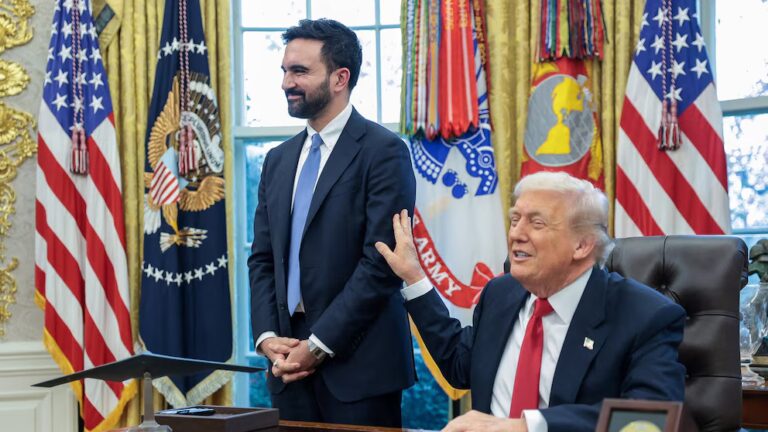Senate Democrats put a quick end to Republicans’ political stunt.

Secretary of Homeland Security Alejandro Mayorkas testifies before the House Homeland Security Committee about the fiscal year 2025 budget on April 16, 2024. Allison Bailey/Middle East Images/AFP/Getty Images Li Zhou is a politics reporter at Vox, where she covers Congress and elections. Previously, she was a tech policy reporter at Politico and an editorial fellow at the Atlantic.
Republicans’ political impeachment stunt against Homeland Security Secretary Alejandro Mayorkas came to a head this week in the Senate, with lawmakers in the upper chamber voting to dismiss the charges.
On Tuesday, House Republicans sent two articles of impeachment against Mayorkas to the upper chamber, and on Wednesday, senators were sworn in as jurors for a trial. The articles accuse Mayorkas of failing to enforce immigration laws, making false statements to Congress, and obstructing oversight into DHS policies, all charges he denies.
On Wednesday, the Senate rejected both articles, voting 51-48 along party lines to deem the first “unconstitutional” and 51-49 to dismiss the second article and adjourn the trial before it even really began. Sen. Lisa Murkowski (R-AK) voted present on the first article.
This is the first impeachment trial of a Cabinet secretary in more than a century. It’s likely to be remembered not as a historic moment of political accountability but as a marker of how polarized Congress has become over the last decade.
The swift conclusion of the proceedings marks a win for Democrats and the Biden administration, who denounced the impeachment effort as a sham and a waste of resources. Democrats have long said that the behavior Mayorkas is accused of does not qualify as “high crimes and misdemeanors,” which is the legal threshold for impeachment.
Republicans, meanwhile, wanted to drag the process out in order to draw more attention to the issue of immigration, and to use the proceedings as a platform to criticize the Biden administration’s immigration policies.
Mayorkas oversees border security and asylum as DHS secretary, so going after him created an opportunity to focus on these subjects and to make election-year promises to voters that the GOP will fix issues at the border if it come back into power. These efforts come as immigration has become a more potent campaign flash point this year because of the surge in migration the US has experienced.
The “trial” showdown, briefly explained
In February, the House voted to impeach Mayorkas after almost a year of hearings and investigations.
Republicans argued that he did not properly enforce immigration laws, citing, in one case, the decision to release migrants after they arrived at the southern border. In fact, that’s an established practice followed by multiple administrations, in part because the US does not have sufficient space to detain people as they await immigration hearings.
Republicans also said that Mayorkas had made false statements to Congress because he testified that the border was “secure,” and that he blocked oversight by failing to respond to subpoenas and offer sufficient access to his office.
Mayorkas has pushed back against the charges, noting that his approach may differ from that of Republicans, but he’s been committed to immigration enforcement and has worked to comply with Congress’s oversight of the agency by providing testimony and documents.
Many Constitutional law experts also said Republicans had not shown that the charges reached a legal bar for impeachment, and that they instead seemed to be founded on policy disagreements. “If allegations like this were sufficient to justify impeachment, the separation of powers would be permanently destabilized,” wrote top scholars, including Harvard’s Laurence Tribe and Berkeley’s Erwin Chemerinsky, in a January letter.
The first phase of the Senate trial on Wednesday took place because the upper chamber needed to fulfill its constitutional duty. Following a House impeachment, the Senate’s job is to hear the charges and determine whether the person should be convicted. If an official is convicted — which requires a two-third majority vote — they would then be removed from their position. The Senate also has the option to dismiss, or table, the impeachment articles if a simple majority votes to do so.
Ultimately, that’s what happened on both articles against Mayorkas, though it wasn’t without some drama. During the process, Republicans were able to force additional votes on “points of order,” or procedural motions regarding how the impeachment should move forward. They used this platform to slam Democrats repeatedly for not holding a full trial like those seen during the impeachment proceedings of former Presidents Donald Trump and Bill Clinton and to try to delay the trial to a later date. The GOP points of order all largely failed on party lines.
The impeachment is political messaging in a campaign year
The impeachment itself is part of a broader GOP strategy to keep the focus on immigration as Republicans campaign on border security ahead of this year’s presidential election.
It’s a strategy that’s worked for them before, including in 2016, when Trump made building a wall at the southern border a central promise of his campaign.
The general public has also historically viewed Republicans as more trustworthy on border security than Democrats. A September 2023 NBC News poll found that 50 percent of voters trust Republicans on this issue, compared to 20 percent who trust Democrats.
Immigration has been especially resonant this year because there’s been a high number of unauthorized crossings at the southern border as global displacement has increased and as instability in some South American countries has forced people to flee.
State Republican leaders, including Govs. Greg Abbott and Ron DeSantis, have drawn attention to this development by busing and flying migrants to Democrat-led cities such as New York City and Chicago. Democratic leaders, including New York City Mayor Eric Adams and Chicago Mayor Brandon Johnson, have kept the focus on the influx of migrants as they’ve sought help from the federal government and imposed harsh eviction policies.
In response to the Mayorkas impeachment, Democratic lawmakers have called Republicans’ focus on the issue disingenuous, as GOP leaders, including Trump, have opposed efforts to pass bipartisan immigration reforms that could help address some of these challenges.
As a result of the attention it’s received in recent months, immigration has become a top issue in key swing states that Republicans hope to flip in order to win back the presidency and retake certain Senate seats. A March 2024 Wall Street Journal poll found that immigration was one of voters’ top two issues in seven key swing states, including Arizona, Pennsylvania, Georgia, and Nevada.
According to research from political scientists Douglas Kriner and Eric Schickler, approaches like this have successfully dented presidents’ approval ratings in the past. The researchers found, for example, that if lawmakers spent 20 days per month on investigative hearings, the president’s approval rating could see a commensurate decline of 2.5 percent in that time.
But while the impeachment of Alejandro Mayorkas was designed to cast negative attention on the Biden administration as Trump navigates countless legal scandals of his own, Senate Democrats’ quick dismissal has dulled much of its impact.
Sourse: vox.com






